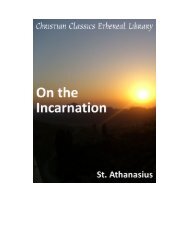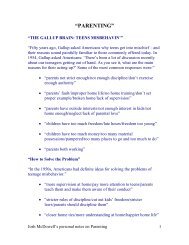Pdf Copy of Orthodoxy, by G.K. Chesterton - Christ United Methodist ...
Pdf Copy of Orthodoxy, by G.K. Chesterton - Christ United Methodist ...
Pdf Copy of Orthodoxy, by G.K. Chesterton - Christ United Methodist ...
Create successful ePaper yourself
Turn your PDF publications into a flip-book with our unique Google optimized e-Paper software.
9/ 27/ 12 The Pr oject G ut enber g eBook <strong>of</strong> O r t hodoxy, G . K. Chest er t on<br />
www. gut enber g. or g/ f iles/ 16769/ 16769- h/ 16769- h. ht m<br />
questions in the darkest corners and on the wildest peaks. We have found all the questions<br />
that can be found. It is time we gave up looking for questions and began looking for<br />
answers.<br />
But one more word must be added. At the beginning <strong>of</strong> this preliminary negative sketch I<br />
said that our mental ruin has been wrought <strong>by</strong> wild reason, not <strong>by</strong> wild imagination. A man<br />
does not go mad because he makes a statue a mile high, but he may go mad <strong>by</strong> thinking it<br />
out in square inches. Now, one school <strong>of</strong> thinkers has seen this and jumped at it as a way <strong>of</strong><br />
renewing the pagan health <strong>of</strong> the world. They see that reason destroys; but Will, they say,<br />
creates. The ultimate authority, they say, is in will, not in reason. The supreme point is not<br />
why a man demands a thing, but the fact that he does demand it. I have no space to trace or<br />
expound this philosophy <strong>of</strong> Will. It came, I suppose, through Nietzsche, who preached<br />
something that is called egoism. That, indeed, was simple-minded enough; for Nietzsche<br />
denied egoism simply <strong>by</strong> preaching it. To preach anything is to give it away. First, the egoist<br />
calls life a war without mercy, and then he takes the greatest possible trouble to drill his<br />
enemies in war. To preach egoism is to practise altruism. But however it began, the view is<br />
common enough in current literature. The main defence <strong>of</strong> these thinkers is that they are not<br />
thinkers; they are makers. They say that choice is itself the divine thing. Thus Mr. Bernard<br />
Shaw has attacked the old idea that men's acts are to be judged <strong>by</strong> the standard <strong>of</strong> the<br />
desire <strong>of</strong> happiness. He says that a man does not act for his happiness, but from his will. He<br />
does not say, "Jam will make me happy," but "I want jam." And in all this others follow him<br />
with yet greater enthusiasm. Mr. John Davidson, a remarkable poet, is so passionately<br />
excited about it that he is obliged to write prose. He publishes a short play with several long<br />
prefaces. This is natural enough in Mr. Shaw, for all his plays are prefaces: Mr. Shaw is (I<br />
suspect) the only man on earth who has never written any poetry. But that Mr. Davidson<br />
(who can write excellent poetry) should write instead laborious metaphysics in defence <strong>of</strong><br />
this doctrine <strong>of</strong> will, does show that the doctrine <strong>of</strong> will has taken hold <strong>of</strong> men. Even Mr.<br />
H.G. Wells has half spoken in its language; saying that one should test acts not like a thinker,<br />
but like an artist, saying, "I feel this curve is right," or "that line shall go thus." They are all<br />
excited; and well they may be. For <strong>by</strong> this doctrine <strong>of</strong> the divine authority <strong>of</strong> will, they think<br />
they can break out <strong>of</strong> the doomed fortress <strong>of</strong> rationalism. They think they can escape.<br />
But they cannot escape. This pure praise <strong>of</strong> volition ends in the same break up and blank as<br />
the mere pursuit <strong>of</strong> logic. Exactly as complete free thought involves the doubting <strong>of</strong> thought<br />
itself, so the acceptation <strong>of</strong> mere "willing" really paralyzes the will. Mr. Bernard Shaw has<br />
not perceived the real difference between the old utilitarian test <strong>of</strong> pleasure (clumsy, <strong>of</strong><br />
course, and easily misstated) and that which he propounds. The real difference between the<br />
test <strong>of</strong> happiness and the test <strong>of</strong> will is simply that the test <strong>of</strong> happiness is a test and the other<br />
isn't. You can discuss whether a man's act in jumping over a cliff was directed towards<br />
happiness; you cannot discuss whether it was derived from will. Of course it was. You can<br />
praise an action <strong>by</strong> saying that it is calculated to bring pleasure or pain to discover truth or to<br />
save the soul. But you cannot praise an action because it shows will; for to say that is merely<br />
to say that it is an action. By this praise <strong>of</strong> will you cannot really choose one course as better<br />
than another. And yet choosing one course as better than another is the very definition <strong>of</strong> the<br />
will you are praising.<br />
The worship <strong>of</strong> will is the negation <strong>of</strong> will. To admire mere choice is to refuse to choose. If<br />
20/ 100





